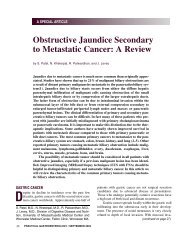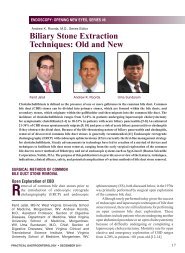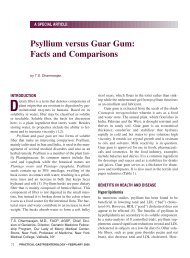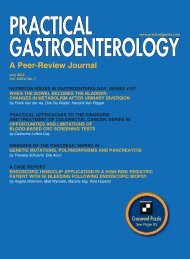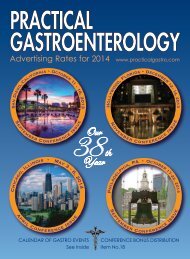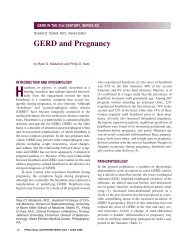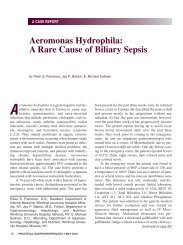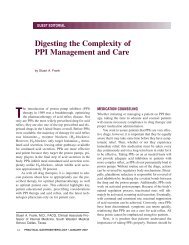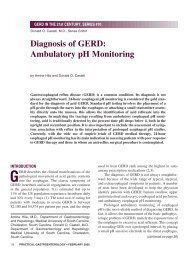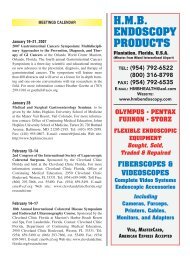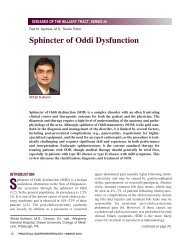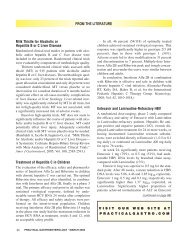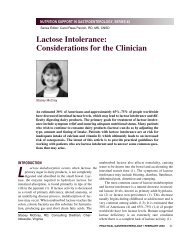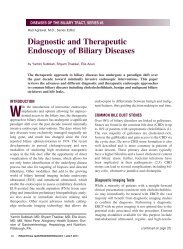Physician Self-Assessment Tool, MKSAP 14 to be Released New ...
Physician Self-Assessment Tool, MKSAP 14 to be Released New ...
Physician Self-Assessment Tool, MKSAP 14 to be Released New ...
Create successful ePaper yourself
Turn your PDF publications into a flip-book with our unique Google optimized e-Paper software.
MEDICAL BULLETIN BOARD<br />
<strong>Physician</strong> <strong>Self</strong>-<strong>Assessment</strong> <strong>Tool</strong>,<br />
<strong>MKSAP</strong> <strong>14</strong> <strong>to</strong> <strong>be</strong> <strong>Released</strong><br />
<strong>New</strong> Edition Includes Online Version<br />
and <strong>Self</strong>-<strong>Assessment</strong> Updates<br />
The American College of <strong>Physician</strong>s (ACP) released<br />
the <strong>14</strong>th edition of its Medical Knowledge <strong>Self</strong>-<br />
<strong>Assessment</strong> Program (<strong>MKSAP</strong> ® ) on July 31, 2006.<br />
Internal medicine specialists, subspecialists, and residents<br />
use the accredited continuing medical education<br />
program <strong>to</strong> prepare for certification examinations, for<br />
lifelong learning, and for improved quality of patient<br />
care.<br />
With its newest addition, <strong>MKSAP</strong> ® has evolved <strong>to</strong><br />
include features that will <strong>be</strong>nefit a variety of <strong>to</strong>day’s<br />
internists, including 11 books, an interactive CD-ROM<br />
and a new non-CME online version that allows anytime,<br />
anywhere learning. A new add-on <strong>to</strong> <strong>MKSAP</strong> <strong>14</strong>,<br />
Board Basics, gives concise, targeted information <strong>to</strong><br />
assist residents preparing for the certification examination.<br />
(Board Basics is available free <strong>to</strong> ACP Associate<br />
mem<strong>be</strong>r subscri<strong>be</strong>rs and for $75 <strong>to</strong> other subscri<strong>be</strong>rs.)<br />
<strong>MKSAP</strong> <strong>14</strong> on CD-ROM and <strong>MKSAP</strong> Online will<br />
<strong>be</strong> released in January 2007. The new <strong>MKSAP</strong> <strong>14</strong><br />
Online will provide all of the features of <strong>MKSAP</strong> <strong>14</strong><br />
on CD-ROM except the ability <strong>to</strong> earn CME credit or<br />
access multi-media tu<strong>to</strong>rials. Twice a year, <strong>be</strong>ginning<br />
in July 2007, Online <strong>Self</strong>-<strong>Assessment</strong> Updates will<br />
provide up <strong>to</strong> 50 new multiple-choice questions and<br />
the opportunity <strong>to</strong> earn up <strong>to</strong> 50 additional CME credits.<br />
The subspecialties will rotate so that each of them<br />
is tested every year. All four updates are available for<br />
an additional $59 or for free <strong>to</strong> buyers of <strong>MKSAP</strong> <strong>14</strong><br />
Complete, which also includes the print, CD-ROM,<br />
and Online versions of the program.<br />
<strong>MKSAP</strong> <strong>14</strong> subscri<strong>be</strong>rs who are enrolled in the<br />
ABIM Maintenance of Certification Program will<br />
have free access <strong>to</strong> specially created <strong>MKSAP</strong> Maintenance<br />
of Certification Modules <strong>to</strong> earn up <strong>to</strong> 80 selfevaluation<br />
process points by using any four of the five<br />
available <strong>MKSAP</strong> 60-question modules.<br />
The newest title in <strong>MKSAP</strong> <strong>14</strong>’s library, Foundations<br />
of Internal Medicine, covers professionalism,<br />
policy and quality improvement and other important<br />
<strong>to</strong>pics at the forefront of the practice of medicine<br />
<strong>to</strong>day. Other titles in Part A include Cardiovascular<br />
Medicine, Gastroenterology and Hepa<strong>to</strong>logy, Rheuma<strong>to</strong>logy,<br />
Neurology, and Hema<strong>to</strong>logy and Oncology.<br />
Part B will <strong>be</strong> published Decem<strong>be</strong>r 29, 2006 and contain<br />
five books: Infectious Disease, Pulmonary and<br />
Critical Care Medicine, General Internal Medicine,<br />
Endocrinology and Metabolism, and Nephrology.<br />
<strong>MKSAP</strong> <strong>14</strong> books have <strong>be</strong>en redesigned for<br />
increased learning efficiency and readability and will<br />
include a full-color layout and more pho<strong>to</strong>graphs and<br />
figures. The new Recent Advances feature alerts<br />
physicians <strong>to</strong> important developments, while the Key<br />
Points feature distills essential information. Selected<br />
references will <strong>be</strong> listed at the end of each section,<br />
while answers and critiques will <strong>be</strong> included in the<br />
same book as the syllabus and the questions. The multiple-choice<br />
questions are tested for difficulty and relevance,<br />
resulting in norm tables that allow subscri<strong>be</strong>rs<br />
<strong>to</strong> compare their performance <strong>to</strong> that of their peers.<br />
<strong>MKSAP</strong> <strong>14</strong> content was planned by a team of<br />
more than 115 leaders in 11 subspecialties who have<br />
reviewed the relevant literature <strong>to</strong> present the <strong>be</strong>st evidence<br />
and the latest practices in the core of internal<br />
medicine. Subscri<strong>be</strong>rs <strong>to</strong> past <strong>MKSAP</strong> editions have<br />
<strong>be</strong>en surveyed <strong>to</strong> ensure the program remains relevant<br />
<strong>to</strong> medical practice and is influential in their medical<br />
decision-making.<br />
Co-edi<strong>to</strong>rs in Chief for <strong>MKSAP</strong> <strong>14</strong> are Patrick C.<br />
Alguire, MD, FACP, direc<strong>to</strong>r of education and career<br />
development for the American College of <strong>Physician</strong>s,<br />
and Paul E. Epstein, MD, FACP, clinical professor of<br />
medicine at the University of Pennsylvania and chief<br />
of pulmonary and critical care medicine at Penn Medicine<br />
at Radnor. “Whether you prefer <strong>to</strong> learn on the<br />
computer or study the printed page, <strong>MKSAP</strong> <strong>14</strong> formats<br />
offer a user-friendly, efficient way for physicians<br />
<strong>to</strong> identify what they know and what needs further<br />
study,” said Dr. Alguire.<br />
<strong>Physician</strong>s who achieve computer-scored test<br />
results significantly above the chance level can earn up<br />
<strong>to</strong> 150 AMA PRA Category 1 Credits(TM) through the<br />
<strong>MKSAP</strong> <strong>14</strong> print and CD-ROM versions. Computer<br />
scoring is available until July 31, 2009.<br />
To order <strong>MKSAP</strong> <strong>14</strong>: Contact ACP Cus<strong>to</strong>mer<br />
Service Department: (800) 523-1546, ext. 2600 or<br />
(215) 351-2600 (M–F, 9 A.M.–5 p.m. ET). Order online<br />
at http://www.acponline.org/catalog/mksap/<strong>14</strong><br />
118<br />
PRACTICAL GASTROENTEROLOGY • SEPTEMBER 2006
MEDICAL BULLETIN BOARD<br />
Prometheus Launches PROMETHEUS ®<br />
IBD Serology 7<br />
V I S I T O U R W E B S I T E A T<br />
P R A C T I C A L G A S T R O . C O M<br />
The Most Comprehensive IBD Test Available<br />
Prometheus Labora<strong>to</strong>ries Inc., has launched Prometheus<br />
IBD Serology 7, an advanced diagnostic panel for<br />
inflamma<strong>to</strong>ry bowel disease. With an overall accuracy<br />
of 92%, this diagnostic test is the most comprehensive<br />
IBD test available with proprietary markers <strong>to</strong> help<br />
physicians diagnose inflamma<strong>to</strong>ry bowel disease (IBD)<br />
and <strong>to</strong> differentiate the subtypes of Crohn’s disease and<br />
ulcerative colitis.<br />
The Prometheus IBD Serology 7 test uses seven<br />
assays, including the new proprietary marker, anti-<br />
CBir1, as compared <strong>to</strong> three assays used by most other<br />
labora<strong>to</strong>ries. The anti-CBir1 marker helps identify<br />
patients with Crohn’s disease, including a unique subset<br />
of patients with Crohn’s disease not previously<br />
detected by other serologic markers.<br />
In addition <strong>to</strong> the new marker, Prometheus IBD<br />
Serology 7 uses a Smart Diagnostic Algorithm (SDA)<br />
<strong>to</strong> calculate the serologic test results. The SDA technology<br />
derives meaning from complicated data by<br />
extracting patterns and detecting trends that are generally<br />
<strong>to</strong>o complex <strong>to</strong> <strong>be</strong> detected by other statistical<br />
means.<br />
“The combination of the new anti-CBir1 marker<br />
and SDA technology is an exciting advance in the field<br />
of IBD diagnostic testing and can provide valuable<br />
information <strong>to</strong> clinicians who use this test as part of<br />
their diagnostic workup,” said Dr. William Sandborn,<br />
Professor of Medicine at the Mayo Clinic College of<br />
Medicine.<br />
“Most serology tests require a trade-off <strong>be</strong>tween<br />
sensitivity and specificity. Prometheus IBD Serology 7<br />
is unprecedented in that it has over 90% sensitivity and<br />
specificity for IBD patients in one test,” stated Dr.<br />
Bruce Neri, Prometheus’ Vice President, Diagnostic<br />
Research & Development. “To gain these levels of performance,<br />
we revolutionized our approach, not only by<br />
adding a new marker, but also by analyzing the data<br />
with a new pattern recognition algorithm. The result is<br />
the first test of its kind.”<br />
Bos<strong>to</strong>n Scientific Launches Radial Jaw ® 4,<br />
<strong>New</strong>est Version of Single-Use Biopsy Forceps<br />
<strong>New</strong> Jaw Configuration Designed<br />
<strong>to</strong> Yield Larger Tissue Specimens<br />
and Improve Procedural Outcomes<br />
Bos<strong>to</strong>n Scientific Corporation announced the U.S.<br />
launch of the newest version of its Radial Jaw ® Single-<br />
Use Biopsy Forceps, featuring more jaw volume and<br />
an improved jaw design compared <strong>to</strong> the market-leading<br />
Radial Jaw 3 Forceps. Radial Jaw 4 Forceps are<br />
designed <strong>to</strong> enable collection of large high quality tissue<br />
specimens without the need <strong>to</strong> use large channel<br />
therapeutic endoscopes.<br />
Acquiring tissue for diagnosis via biopsy is the<br />
most frequently performed procedure by gastroenterologists.<br />
In 2005, approximately 5.8 million endoscopic<br />
biopsy procedures were performed in the U.S.<br />
<strong>to</strong> diagnose various gastrointestinal diseases, including<br />
esophagitis, Barrett’s esophagus, gastritis, Crohn’s disease,<br />
ulcerative colitis and cancer.<br />
The new jaw configuration of the Radial Jaw 4<br />
Forceps is intended <strong>to</strong> provide larger tissue specimens<br />
than Radial Jaw 3 Forceps in order <strong>to</strong> facilitate tissue<br />
sample handling and preparation for accurate his<strong>to</strong>logical<br />
diagnosis. The forceps are also designed for<br />
consistent sample retention and enhanced passability.<br />
The Radial Jaw 4 Forceps can now extract a large<br />
tissue specimen through a 3.2 mm working channel of<br />
an endoscope, as opposed <strong>to</strong> the 3.7 mm working<br />
channel required with a previous version.<br />
“Biopsies are critical for the accurate diagnosis of<br />
any gastrointestinal disorder,” said Russell Yang,<br />
M.D., Keck School of Medicine, University of Southern<br />
California. “The new enhancements <strong>to</strong> Radial Jaw<br />
4 Forceps, such as the ability <strong>to</strong> use a smaller, more<br />
common endoscope and still acquire large samples,<br />
make the Radial Jaw even more valuable for acquiring<br />
tissue <strong>to</strong> accurately diagnose a patient’s condition.”<br />
PRACTICAL GASTROENTEROLOGY • SEPTEMBER 2006 119



